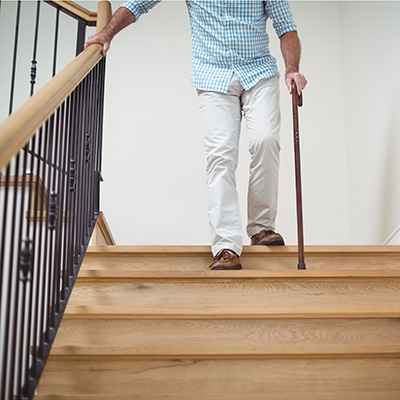Neurological Disorders: Take Strides To Reduce Your Fall Risk
Posted July 18, 2022

Revised January 2026
Falls are an unfortunate, yet frequent complication for people with neurological disorders. Neurological disorders affect the brain, spinal cord or peripheral nerves. Examples include pinched nerves in the spine, neuropathy, stroke, traumatic injuries to the brain or spine and Parkinson’s disease. These conditions can cause muscle weakness, balance issues, poor coordination, loss of sensation, pain and much more.
Due to these symptoms, people with neurological disorders may be at an increased risk for falls and the potentially life-changing consequences of fall-related injuries. Falls and related injuries are very important as they can have negative impacts on our mobility, living independently and overall quality of life. The good news is there are things you can do to reduce your risk.
Summa Health offers three steps patients with neurological disorders can take to improve balance and reduce their risk for falls and fall-related injuries.
1. Start a Conversation About Symptoms and Medications
Talk to a neurologist or primary care physician to discuss any symptoms that may be contributing to your increased fall risk. Pain, numbness, weakness and imbalance may all contribute to falls. If those symptoms are not well managed, ask your doctor for ways to minimize them.
In addition, there are some medications that can affect your brain and sensory function. Sleeping pills and sedatives can affect coordination. Some blood pressure medications can cause blood pressure drops upon standing — increasing your fall risk.
If you have concerns about your current medications — both prescription and over-the-counter — discuss them with your doctor. Together, you can assess the benefits and potential risks of necessary medications.
Also, keep a complete list of all your medications and dosages so your doctor has a full picture of what you’re taking and can help you avoid adverse drug reactions to the brain and sensory function.
2. Work to Improve Your Balance and Strength
Seek out medical professionals who specialize in comprehensive treatment for balance management. Physical therapy that addresses balance and strengthening has been shown to reduce a person’s risk for falls. A physical therapist can identify problem areas and develop an exercise routine that can be effective in helping to reduce falls and fall-related injuries.
It is important to not only meet with a physical therapist, but also to begin home exercises to improve your balance and strength.
Inactivity can result in the loss of muscle tone and weakness, as well as poor posture and impaired balance. Even simply going for a walk regularly can improve strength, muscle tone and coordination.
3. Be Aware of Environmental Hazards and Tripping Risks
Eliminating hazardous conditions in your physical environment is an important strategy for fall prevention.
Reduce risk in your home by:
- Removing any loose rugs, cables or other tripping hazards.
- Installing grab bars and nonskid tape in your tub and shower. Use nonskid bath mats or install carpet in the bathroom. If necessary, use shower chairs and bath benches to minimize fall risks.
- Making sure hallways, stairwells and rooms are well lit. Install nightlights in your bathrooms and hallways to illuminate pathways. If you need to get up in the middle of the night, turn on a light so you can see where you’re going.
- Installing handrails on both sides of the stairwell. If unable to use stairs safely, avoid using them by bringing all your necessities to one floor.
- Removing raised doorway thresholds in all rooms. Arrange furniture to keep electrical cords and furniture out of walking paths and get rid of clutter.
Paying close attention to your environment and navigating carefully are the most effective ways to prevent injuries. Wearing sturdy shoes with good traction is also helpful. Avoid walking barefoot or with sandals. It may be necessary to use a mobility aid such as a cane, walker or scooter especially on uneven ground or in unfamiliar surroundings.
About the Author
Vitality eNews Sign Up
Receive the Summa Health eNewsletter for the latest health tips, advice and updates.

